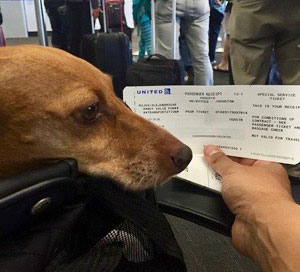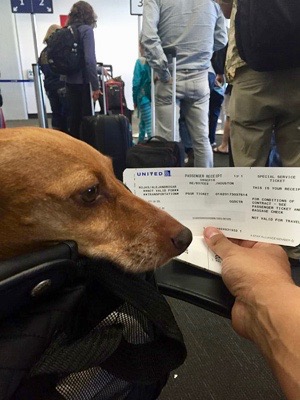!This story has an important update


Photo by Dr. Alejandro Garcia
Cash waits in his carrier to board a flight. Because the pet was disabled and traveling for surgery, United mistook him for a "handicap dog" and allowed him to fly in a seat beside his owner. A new, more rigorous policy on unconfined support animals in flight cabins makes it less likely that United will make such mistakes in the future.
United Airlines has joined Delta in a crackdown on support animals riding with their owners in airplanes, implementing a policy effective Thursday that asks veterinarians to vouch for an animal's behavior before it is allowed on board.
The requirement is a twist on a trend as the airline industry tightens rules for flying with animals in the cabin, prompted by a reported uptick in support animals on flights and several high-profile incidents.
United made the news last month when a passenger in New Jersey attempted to board with a peacock said to be an emotional-support animal. United turned away the peacock. In a more harrowing incident reported in June by the Atlanta Journal-Constitution, a 50-pound dog traveling as an emotional-support animal on the lap of its owner bit another passenger in the face, necessitating 28 stitches.
Emotional-support animals, also known as ESAs, provide comfort to people who have clinical mental illness, such as anxiety disorders. Support animals are not the same as service animals, which are trained to do specific tasks to aid people with disabilities. Service and support animals alike may fly for free in airline cabins and need not be confined. In contrast, passengers traveling with ordinary pets must pay a fee and place the pets in cargo or under a seat in a carrier.
Delta was the first airline to announce a policy revision for service and support animals, stating in a Jan. 19 post that "a lack of regulation ... has led to serious safety risks involving untrained animals in flight." Delta's new rules, which take effect also on Thursday, do not involve veterinarians apart from requiring a signed veterinary health form or immunization record.
To fly on United, however, passengers wishing to bring support animals must have a veterinarian complete a form with the animal's name, type, breed, weight (if more than 20 pounds), and dates of rabies and distemper vaccinations, if applicable to the type of animal. The veterinarian is asked to initial the statement "I am not aware of any reason to believe that this animal would pose a direct threat to the health or safety of others."
The form also asks the veterinarian: "What measures, if any, would be helpful to safely carry this animal in the aircraft cabin?" Options are "kennel," "muzzle," "this animal should only travel in cargo hold" and "other."
The United form is highly unpopular among veterinarians, judging from a message board discussion on the Veterinary Information Network, an online community for the profession. Most participants in the 152-post discussion said they would refuse to sign anything affirming an animal's behavior.
Dr. Rachael Carpenter of Blacksburg, Virginia, said she can't even vouch for her own dog on an airplane, much less a client's dog. She wrote: “I couldn't guarantee how my dog would do in those situations. And he has his Canine Good Citizen (CGC) and is a certified (and credentialed) therapy dog ... and has been invited to many different types of public places.”
In an interview, Carpenter said dogs are situational learners, meaning that simply because a dog knows something at home doesn't mean it will apply that knowledge in a different setting.
“Since he has never been exposed to or trained for any type of public transportation, I don’t have any idea how he would react,” she said. (The CGC test does not cover exposure to transportation. By comparison, service dogs are trained in a variety of transportation venues.)
One veterinarian who is amenable to filling out United's form for support animals is Dr. Bruce Henderson of Clifton, New Jersey.
"Actually, I would not have a problem signing that document," Henderson wrote in the VIN discussion. "They are not asking you to guarantee that the pet won't bite anyone, just to ask if you are 'aware of any reason to believe that the pet would pose a direct threat to the health or safety of others.' ... If we have 'caution,' 'muzzle' or 'nervous' on the [animal's] record, I would not initial that part of the form. I would also not have a problem indicating that the pet should be in a carrier or wear a basket muzzle."
Still, it might be a good idea for veterinarians to have their professional liability-insurance carrier review the form, Henderson added.
From United's point of view, whether a signing veterinarian assumes liability if the animal becomes disruptive or bites someone is undetermined. “This question would be handled on a case-by-case basis,” United spokesperson Charles Hobart told the VIN News Service.
“What vets are supposed to do is affirm that there is no reason to believe an animal will pose a direct threat,” Hobart said, noting that it is not the same as asking veterinarians to assure that the animal won't behave dangerously. "We just ask vets if they think animals would be able to do it."
Still, Hobart acknowledged, "It’s not untrue to say liability would be determined on a case-by-case basis because it’s a legal document. Will it get to that point? I don't know, but I think that’s an unlikely scenario.”
Raphael Moore, general counsel for VIN, said the form is fraught with legal risk for veterinarians. He advises they not sign it. “[A]side from the obvious cases where a veterinarian may require a muzzle for the safety of their own staff in the clinic, this opens up a can of worms,” Moore said in an interview by email. “Any mishap with the animal would bring the knowledge (or alleged knowledge) of the veterinarian into question. Were they ‘aware'? Is the mishap of sufficient caliber to constitute a ‘threat'?”
Similarly, asking the veterinarian what measures would be helpful is asking the doctor to anticipate every scenario, Moore said. "Arguably, all of those measures would be 'helpful,' so veterinarians who don't select all of the options could find themselves in the crosshairs of the airline, its staff, every passenger, and potentially anyone handling the animal throughout the trip," he said.
He continued: “The ‘case by case’ answer [from United spokesperson Hobart] really means ‘we will decide in each case whether we go after the veterinarian, depending on whether or not it looks like our airline may be at fault.' ”
Aware of the veterinary community's concerns, the American Veterinary Medical Association is attempting to negotiate changes to the form, according to AVMA spokesperson Michael San Filippo. "During a telephone call with United immediately after they announced their new policy, they indicated that they would be happy to discuss any suggestions the AVMA had regarding their form. At that time, the actual form wasn’t yet available for review," San Filippo recounted by email. "When the form was posted online, the AVMA reviewed that form with support from the AVMA professional liability program (PLIT), and — last week — wrote to United requesting revisions as described above. We have followed up by phone and are currently awaiting a response to our suggestions."
Meanwhile, the AVMA PLIT is developing guidelines for veterinarians that it anticipates releasing soon, said Brian Heath, spokesperson for the insurance trust's broker Hub International Midwest Limited.
Safehold, another insurer, does not have a formal assessment of the liability assumed by signing the form but Elizabeth Williams, an underwriter for Safehold's veterinary program, said: “I think it is possible that if a veterinarian signed one of these documents that there could be some liability on their part. I don't think you can ask a veterinarian how a dog will respond in an unfamiliar environment surrounded by strangers."
Hobart said United had looked to the U.S. Department of Transportation (DOT) to set an industrywide standard for handling service animals, including support animals, on flights, but the agency has not done so to date.
DOT spokesperson Caitlin Harvey told VIN News that the agency's Advisory Committee on Accessible Air Transportation considered the issue in 2016 but was unable to come to consensus. However, the DOT plans this year to propose a rule that would "address the appropriate definition of a service animal and include safeguards to reduce the likelihood that passengers wishing to travel with their pets on aircraft will be able to falsely claim that their pets are service animals," according to a government posting.
As the popularity of traveling with support animals increases, so too have instances of travel with apparently fraudulent support animals. By claiming their pet is a support animal, people avoid the rules and fees on traveling with ordinary pets. Unlike service dogs, faux support animals are unlikely to be trained specifically for traveling.
The trade organization Airlines for America (A4A) believes that the spreading availability online of false emotional-support-animal credentials is fueling a rising number of passengers falsely representing their pets as medically necessary.
“As a result, airlines have seen an escalation in the number of complaints and unfortunate incidents, some of which involve animals causing in-flight disturbances,” A4A spokesperson Alison McAfee said. “This negatively impacts our crew, other passengers and those with service animals who genuinely need them.”
Hobart at United said airlines are limited in their ability to challenge the authenticity of support-animal papers.
“There are times when we believe folks have traveled with a document that may not be authentic but people at the gates have to accept them,” Hobart said. “If someone arrives with proper documentation, they can fly. ... [T]here are a number of regulations and laws in place, and we want to do what we can for customers who require those animals."
He added, "We need to revisit this, and put new policies in place.”
Current DOT regulations require that airlines accept a wide variety (both in size and species) of service animals and support animals, according to McAfee. The rules also limit the industry’s ability to inquire about the nature and legitimacy of a passenger’s claim of disability, she said.
A4A advocates that the DOT amend its rule to define service animals as trained service dogs, to align with the definition in the Americans with Disabilities Act. It also would like to see limits on the types of emotional-support and psychiatric-service animals required to be accommodated "because these animals cause the majority of inflight disruptions," McAfee said.
Meanwhile, more airlines are reviewing their policies on support animals. Among them is American Airlines, whose spokesperson Ross Feinstein said, “Unfortunately, untrained animals can lead to safety issues for our team, our passengers and working dogs onboard our aircraft."
Southwest Airlines also reportedly is reviewing its policy, although spokesperson Brian Parrish told VIN News on Monday that the company has no immediate changes to announce. He indicated that Southwest is trying to balance the problem of unruly animals with the needs of passengers who legitimately require support. "We’re constantly evaluating our policies and procedures, as Southwest is committed to providing an accessible travel experience for customers with disabilities," Parrish said.
Update: United has revised its veterinary health form to remove potential liability risks for veterinarians, according to a March 2 post by the American Veterinary Medical Association. The amended form is posted on the airline's website.
Dec. 7, 2020 update: In a revision to its Air Carrier Access Act regulation, the DOT has issued a final rule on traveling by air with service animals. The rule defines a service animal as a dog that is individually trained to do work or perform tasks for the benefit of a person with a disability. Under the rule, emotional support animals no longer are considered to be service animals, which clears the way for airlines to restrict them.